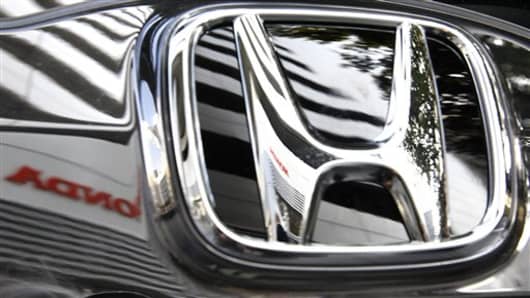Japanese automobile giant Honda disappointed markets with a trimmed forecast for 2013 this week, but the negative number masks signs of a recovery for the automaker and the rest of the nation's battered sector, said analysts.
The nation's third largest automaker reported an increase in its net profit for October-December at 77.4 billion yen ($849.94), up by 63 percent from 47.7 billion yen in the same period last year. But markets clung to the downward revision of its annual net profit forecast, by 1.3 percent to 370 billion yen. Honda blamed flagging car sales in China and the depressed demand in Europe. Honda's share price fell 2.6 percent from 3,565 yen to 3,470 on Friday on the Tokyo Stock Exchange.
(Read more: Honda Trims Full-Year Profit Forecast on China Hit )
Honda is the first of a string of eagerly-watched automobile earnings reports scheduled in the coming days. Toyota's numbers are due out on February 5, followed by Mazda's on February 6 and Nissan on February 8. The results are expected to give an indication of the extent to which the East China Sea island dispute is still taking its toll on the sector.
Christopher Richter, senior auto analyst at Asia-Pacific brokerage CLSA's Tokyo office, said the overhang of the dispute may continue to weigh on the earnings next week, but he believes the concerns will ease within months, and become a "non-issue" moving through 2013.
"Honda's numbers were a little disappointing, but a lot of that stems from how much Chinese demand is impacting operating income. I expect Honda and other impacted autos to fully recover from this over the next few months. We have already seen numbers improve and both China and Japan extend olive branches. I expect things to normalize in the next few months which explains why Honda has not been punished too severely by the market," said Richter.
"The problem is reporting is still backward looking, but the new launches in the pipeline mean the sector has a strong outlook for the year, especially as the territorial dispute issue eases off and they continue to be supported by the weak yen," he added.
Masaki Honda, principal consultant of automotive & transportation at Singapore-based business consultancy Frost & Sullivan, agreed that that cross straits ties will improve by year-end, resulting in an improved outlook for Japanese autos, but said a few months may be too optimistic a time frame.
"I don't think it will recover within a few months but I believe it will return to pre-dispute level by the end of 2013," he said, adding that strong demand from emerging markets this year will also support Japan automakers' sales.
Tensions between Japan and China flared up in September last year, after Japan bought three disputed islands in the East China Sea earlier this month, triggering violent protests across China last week and threatening economic ties between Asia's two biggest economies.
Japan's car industry was among the hardest, after Chinese boycotted sales of all things Japanese. Toyota and Honda's September sales last year, for example, slumped by 48.9 percent and 40.5 respectively. China sales account for roughly 10 percent of the Japanese auto sector's overall revenue, according to Frost & Sullivan research.
(Read more:
Shares of Japanese automakers were also hit hard. In the immediate aftermath of the dispute, shares of major automakers tested year lows, with Toyota falling 4.8 percent to 2,903, Honda dropping 5.2 percent percent to 2,319 yen and Nissan slumping 10 percent to 722 yen.
The stocks have since recovered sharply, by as much as 54 percent, in line with the recent rally in Japanese stocks. On Friday, Toyota's stock finished Tokyo trade at 4,495 yen, Honda ended at 3.515 yen, while Nissan closed at 935 yen.
Room for Stocks to Rise
Despite the big gains, Richter said there is still substantial upside for the stocks, and singled out Nissan and Toyota as his best picks.
"Toyota recently announced it was investing in this plant which was a large shot in the arm for Mazda. Before this announcement the firm was pretty much left for dead so it has seen a huge turnaround," he said.
As for Nissan, Richter said the stock remains undervalued, but is set to benefit from the launch of new products (what products are these) in the U.S. later this year.
On Friday Toyota's price-to-earnings ratio stood at 15.6, while Nissan's was 11.52.
A positive headwind for Japanese automobile sector outlook has been the yen's recent weakening against the dollar, as companies are able to convert overseas profits back to yen at the more favorable rate and export cars more cheaply. The yen's value has eased substantially since September last year, rising from 78 to the dollar at the start of 2012 Q4 to around 91 to the dollar on Friday.
However, CLSA's Richter said the positive impacts of the yen could reverse at any time: "The yen is a huge positive right now. But that said, that knife can turn and cut you any time. Hence, the original equipment manufacturers (OEMs) are still forging ahead to reduce exchange rate risk," he said.
- CNBC.com's Katie Holliday.


